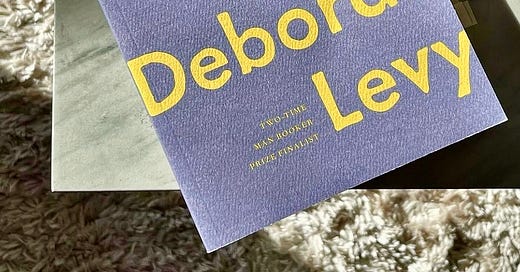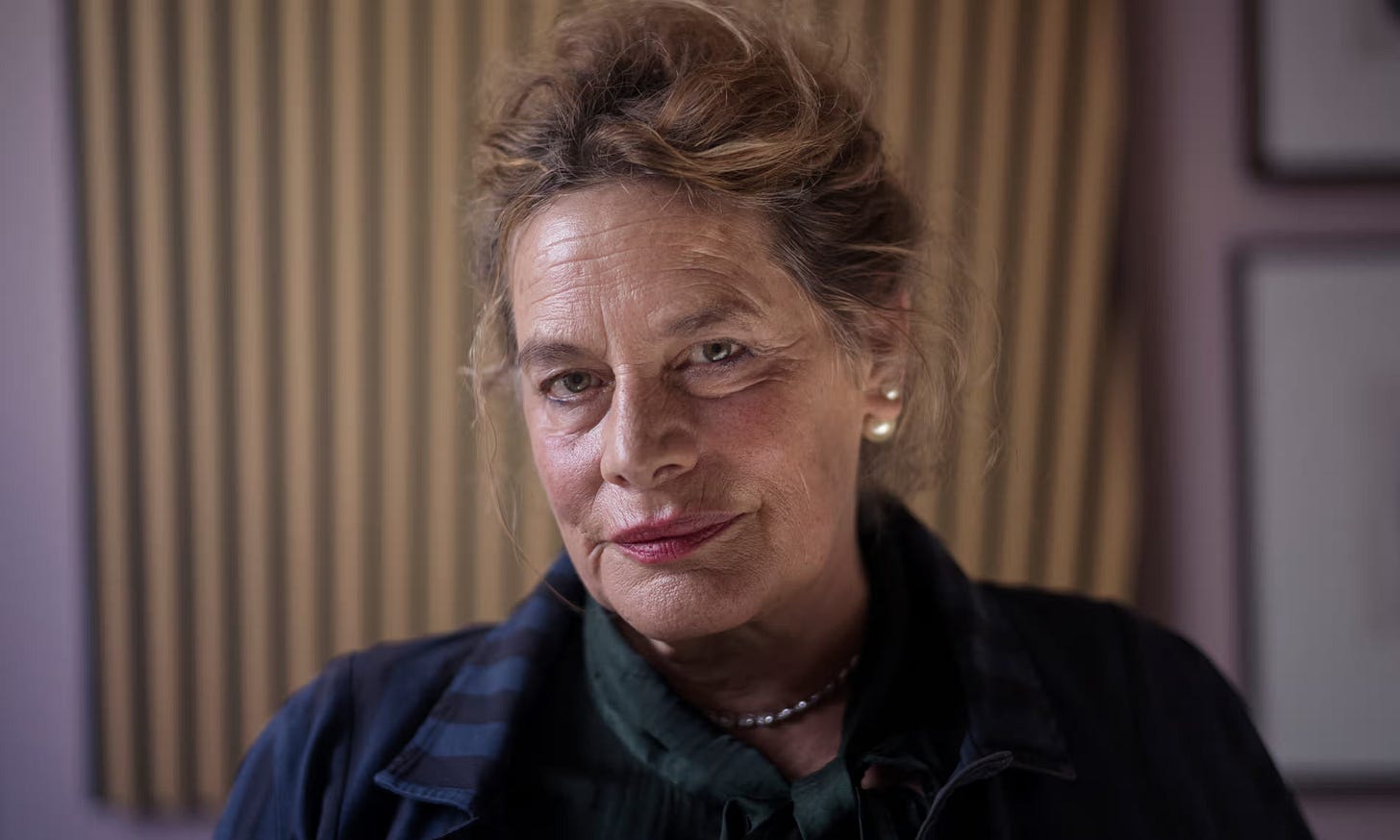On Reading, Listening, and Living When Things Fall Apart
The new war, Deborah Levy, Ralph Towner, meaning and senselessness, the gifts of trivial absurdity
How are you doing? This week was difficult for many of us. We struggled to make sense of a new war’s senseless atrocity and tragedy. We wanted to stay attuned to suffering on both sides without minimizing horrendous acts. We called to check in on loved ones in the region and our people with close friends and family there.
In the past, we may have turned to the online world to share and process our feelings. The internet has changed in profound ways. I saw some propaganda, absolutism, and other familiar signs of online culture wars; I also observed far fewer people reflexively posting the flag of one nation or another. The slaughter of children and other innocents brings up thoughts and emotions too complex for a short social media post, many affirmed.
I’m no specialist in this age-old geopolitical nightmare. No one needs me to weigh in on it. Yet I can’t pretend as if this were a normal week. So I’ll share a bit about how I worked to not turn away, as we say in Buddhism, and remain engaged with current events while also not rushing to make trite or cliched sense of incomprehensible violence.
If you’re up to it, please share where you found meaning or comfort in the comments.
Deborah Levy and Things We Don’t Want to Know
Instinctively this week I returned to Deborah Levy’s books. Maybe you’re lucky enough to know her brilliant work?
Levy’s latest novel, August Blue, involves a piano virtuoso whose most recent major performance fell apart spectacularly onstage. The character floats around Europe teaching private students as she navigates the late pandemic period. Our protagonist has lost her identity; she finds both sadness and possibility in this loss.
This was what drove me back to Levy’s books: Her characters tend to live with disruptions both historical and personal, negotiating unease and the unraveling of identity.
Deborah Levy was born in South Africa and moved to London at age nine after her anti-apartheid father was imprisoned for his involvement in the African National Congress. Rather than relating to standard narratives of exile, Levy began her writing career as an experimental playwright who fooled around with Freudian theory. She then moved on to fooling around with Freudian theory in engaging novels that glimmer with deeper truths. Her most beloved writing is a series of memoir-esque works she calls “living autobiography:” The Cost of Living, Things I Don’t Want to Know, and Real Estate.
The writer Summer Brennan caught a Levy talk at the American Library in Paris last year. In the talk, Levy said these living autobiographies were created “more or less in the storm of life” or in the middle of the action, rather than from some reflective vantage point that would afford wisdom. It’s nearly universal creative writing dogma that memoir’s raison d’etre is looking back on experience to find insight. Not for Levy, who believes this approach results in too many dull platitudes.
“Wisdom is so boring,” Deborah said, “so I didn’t really want to do that.”
Meaning, however, animates Levy’s living autobiographies. She finds quiet emotional force in a careful excavation of daily life. A common phrase in Levy’s writing is “things we don’t want to know” (Freud again). This phrase and Levy’s work-at-large resonated with me this week: Not turning away from the darkness of world events while also refusing to settle for bromides or simple answers.
I recommend all of Levy’s books and this consummate Guardian profile from last spring. She’s a true character. For those of you who prefer audio, the piece also comes in podcast form.
Like A Prayer: Ralph Towner’s Anthem Album
This week, I pulled out Ralph Towner’s Anthem album as instinctively as I’d turned to Deborah Levy’s books. When I saw its release date of March 2001, I remembered also having the album on steady rotation just after 9/11.
Anthem is a collection of solo guitar pieces. With no overdubs, the recording feels like a live concert of improvised classical music. It’s soothing stuff, for sure, but with a sense of propulsion and open-ended storytelling that sustained me this week. Towner’s guitar feels so attuned to sheer humanity that it rings out like a prayer. I listened to it while I read reports from the Middle East.
I’m no audiophile. Still, Anthem is so beautifully recorded that it’s worth listening on the best stereo in your house.
Stop Making Sense: The Easy Edition
The struggle to reckon with the new war’s senseless violence puts trivial absurdity in some perspective.
This week, my twelve-year-old son started playing on his school’s basketball team. He needed shoes. Since we weren’t sure of his ever-increasing size, I drove him to Dick’s Sporting Goods. We followed the scent of leather and vinyl to the shoe section where a vast selection was displayed.
We looked around. Nobody was there to help. Anyone who’s gone to brick-and-mortar stores lately knows this scenario. The full staffing that enables customer service has all but disappeared in the pandemic’s wake.
The thing is, this physical store’s shoe sales still depend on the service model. A customer browses the display, relying on an employee to fetch shoes in the right size from an otherwise inaccessible storeroom.
My son and I were not at all upset. This was not a week to be vexed by mere inconvenience. It was curious, we said, this quaint design of the shoe section for service that no longer exists.
My son tracked down a teenage sales associate (“The only one I could find in the whole store”) who wandered over but offered little help. In the past, she might have been called lazy or incompetent. Gone now are the culture and incentives that once encouraged an employee like her to sell shoes well. Why should she help customers? So she can be overburdened with even more work for the same pay?
I made some self-deprecating jokes about my middle-aged ignorance of newer basketball shoes. She laughed and went on making no effort to help us. Her quiet, good-humored quitting was its own form of competency, though. The shoe section’s service-based design no longer made sense; the sales associate’s response to her work environment made perfect sense. Let Bartleby be Bartleby.
If the shoes we wanted were indeed back in that storeroom, we weren’t getting them. We’d move on to another store. On our way out, I realized I how lucky I was to be stumbling around this benignly absurd retail world with my son beside me so alive and healthy that he was outgrowing what I could fathom for him. As we saw this week, senselessness comes in much, much worse forms.
.








Do you know one of the anthems of the Grateful Dead, Buddy Holly’s Not Fade Away? It was not until reading Call & Response today that I understood that that phrase—“our love is real, not fade away”—might echo the Buddhist invection to not turn away.
I made the choice not to turn away as well as challenging my college freshmen not to ignore the horrific news and the sights filling everyone's screens. I said to them that this is the world you are growing up into and you need to know about its twists-and-turns, its grotesque nature, just as much as you need to remember the sun will come up tomorrow–the natural world goes on no matter how much it's being decimated in the name of war and economy. But no music assuaged my fears that the world tilted off-balance even more in the last week due to the ineptitude and selfishness of certain politicians in the US and abroad and the murderous intent of those who claim to fight for their God yet use women and children as human shields.